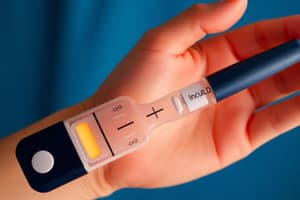Podcast
Questions and Answers
Which symptom is commonly associated with bradykinesia in Parkinson's Disease?
Which symptom is commonly associated with bradykinesia in Parkinson's Disease?
- Rapid alternating movements
- Increased arm swing
- Postural instability (correct)
- Trembling in the upper extremities
What is a significant finding in the physical exam of a patient with Parkinson's Disease?
What is a significant finding in the physical exam of a patient with Parkinson's Disease?
- Increased facial expressions
- Hyperreflexia
- Supranuclear gaze palsy
- Pill-rolling tremor (correct)
Which of the following is NOT a key symptom of Parkinson's Disease?
Which of the following is NOT a key symptom of Parkinson's Disease?
- Hypophonia
- Anosmia
- Micrographia
- Tachycardia (correct)
What imaging technique is used primarily to rule out secondary causes of Parkinson's Disease?
What imaging technique is used primarily to rule out secondary causes of Parkinson's Disease?
What distinguishes a seizure from Parkinson's Disease regarding symptoms?
What distinguishes a seizure from Parkinson's Disease regarding symptoms?
Which of the following features is least indicative of Parkinson's Disease?
Which of the following features is least indicative of Parkinson's Disease?
Which investigation provides evidence of reduced dopamine transporters in a patient suspected of having Parkinson's Disease?
Which investigation provides evidence of reduced dopamine transporters in a patient suspected of having Parkinson's Disease?
What finding would argue against a diagnosis of seizures in the context of bradykinesia?
What finding would argue against a diagnosis of seizures in the context of bradykinesia?
Which of the following is a distinguishing symptom of Essential Tremor compared to Parkinson's Disease?
Which of the following is a distinguishing symptom of Essential Tremor compared to Parkinson's Disease?
What is a common pharmacological treatment for Parkinson's Disease?
What is a common pharmacological treatment for Parkinson's Disease?
Which condition is characterized by an early prominent cognitive decline?
Which condition is characterized by an early prominent cognitive decline?
Which class of drugs would you use cautiously in a patient experiencing Parkinsonism due to dopamine-blocking drugs?
Which class of drugs would you use cautiously in a patient experiencing Parkinsonism due to dopamine-blocking drugs?
How does postural instability manifest in Parkinson's Disease?
How does postural instability manifest in Parkinson's Disease?
Which investigation is essential for the clinical diagnosis of Parkinson's Disease?
Which investigation is essential for the clinical diagnosis of Parkinson's Disease?
What is a significant complication associated with Parkinson's Disease management?
What is a significant complication associated with Parkinson's Disease management?
Which of the following is NOT a characteristic feature of Parkinson's Disease?
Which of the following is NOT a characteristic feature of Parkinson's Disease?
Which symptoms would most likely support a diagnosis of Essential Tremor?
Which symptoms would most likely support a diagnosis of Essential Tremor?
What is a key feature that distinguishes Progressive Supranuclear Palsy (PSP) from Parkinson's disease?
What is a key feature that distinguishes Progressive Supranuclear Palsy (PSP) from Parkinson's disease?
Which factor would indicate a diagnosis of Drug-Induced Parkinsonism?
Which factor would indicate a diagnosis of Drug-Induced Parkinsonism?
In the management of Parkinson's disease, which treatment is considered first-line for symptom relief?
In the management of Parkinson's disease, which treatment is considered first-line for symptom relief?
What is a common characteristic of a Parkinsonian gait?
What is a common characteristic of a Parkinsonian gait?
Which of the following treatments is appropriate for advanced Parkinson's disease cases with motor complications?
Which of the following treatments is appropriate for advanced Parkinson's disease cases with motor complications?
Which disorder is characterized by stiff, scissoring motion due to spasticity?
Which disorder is characterized by stiff, scissoring motion due to spasticity?
What features are associated with Ataxic Gait?
What features are associated with Ataxic Gait?
Flashcards
Carotid bruit causes
Carotid bruit causes
Atherosclerosis of the carotid artery, irregular heartbeat, or atherosclerotic disease.
Carotid stenosis detection
Carotid stenosis detection
Carotid Doppler Ultrasound is used to detect the narrowing in the carotid arteries.
Parkinson's disease symptoms
Parkinson's disease symptoms
Bradykinesia, resting tremor (pill-rolling), rigidity, postural instability, anosmia, hypophonia, micrographia, depression, and autonomic dysfunction (e.g., constipation, orthostatic hypotension).
Parkinson's Disease Etiology
Parkinson's Disease Etiology
Signup and view all the flashcards
Parkinson's physical exam
Parkinson's physical exam
Signup and view all the flashcards
Ischemic stroke diagnosis
Ischemic stroke diagnosis
Signup and view all the flashcards
Parkinson's DaTscan result
Parkinson's DaTscan result
Signup and view all the flashcards
Ischemic stroke vs. seizures
Ischemic stroke vs. seizures
Signup and view all the flashcards
Essential Tremor
Essential Tremor
Signup and view all the flashcards
Parkinsonian Gait
Parkinsonian Gait
Signup and view all the flashcards
Hemiplegic Gait
Hemiplegic Gait
Signup and view all the flashcards
Spastic Gait
Spastic Gait
Signup and view all the flashcards
Ataxic Gait
Ataxic Gait
Signup and view all the flashcards
Levodopa/Carbidopa
Levodopa/Carbidopa
Signup and view all the flashcards
Multiple Sclerosis (MS)
Multiple Sclerosis (MS)
Signup and view all the flashcards
Uhthoff's phenomenon
Uhthoff's phenomenon
Signup and view all the flashcards
Stool pH acidic and reducing substances positive
Stool pH acidic and reducing substances positive
Signup and view all the flashcards
Parkinson's Symptoms
Parkinson's Symptoms
Signup and view all the flashcards
Hyperthyroidism Etiology
Hyperthyroidism Etiology
Signup and view all the flashcards
Hyperthyroidism Symptoms
Hyperthyroidism Symptoms
Signup and view all the flashcards
Hyperthyroidism Investigations
Hyperthyroidism Investigations
Signup and view all the flashcards
Parkinson's Differential Diagnoses
Parkinson's Differential Diagnoses
Signup and view all the flashcards
Hyperthyroidism Management
Hyperthyroidism Management
Signup and view all the flashcards
Study Notes
Diabetic Ketoacidosis (DKA)
- Insulin deficiency leading to ketone production
- Triggered by illness, non-compliance, or stress (e.g., surgery)
- Symptoms: Polyuria, polydipsia, nausea, vomiting, abdominal pain, Kussmaul respirations (deep, labored breathing), fruity breath odor, altered mental status
- History: Diabetes history, insulin use, recent infections, polyuria/polydipsia, weight loss
- Investigations: Blood glucose (>250 mg/dL), arterial blood gas (metabolic acidosis with anion gap), serum ketones, electrolytes (low bicarbonate, hyperkalemia), urinalysis (ketones, glucose)
- Differential Diagnoses: Hyperosmolar hyperglycemic state (HHS), sepsis, lactic acidosis
- Management: IV normal saline initially (1L in the first hour), insulin infusion, treat underlying cause (e.g., antibiotics for infection), add 5% dextrose to fluids when blood glucose falls to 200–250 mg/dL
- Complications: Hypokalemia, cerebral edema, arrhythmias
Celiac Disease
- Autoimmune response to gluten in genetically susceptible individuals (HLA-DQ2/DQ8)
- Symptoms: Diarrhea, bloating, weight loss, fatigue, dermatitis herpetiformis
- History: Chronic diarrhea, anemia, family history, gluten exposure
- Investigations: Anti-tTG (tissue transglutaminase) antibodies, duodenal biopsy (villous atrophy), IgA deficiency
- Differential Diagnoses: IBS, Crohn's disease, lactose intolerance
- Management: Gluten-free diet, nutritional supplementation (iron, calcium, vitamins)
- Complications: Malabsorption, osteoporosis, enteropathy-associated T-cell lymphoma (EATL)
Parkinson's Disease
- Degeneration of dopaminergic neurons in the substantia nigra
- Symptoms: Bradykinesia, rigidity, resting tremor, postural instability, gradual onset, handwriting changes, tremor, falls, sleep disturbances
- Investigations: Clinical diagnosis, MRI to rule out secondary causes
- Differential Diagnoses: Essential tremor, drug-induced Parkinsonism, Lewy body dementia
- Management: Levodopa-Carbidopa, dopamine agonists (Pramipexole, ropinirole), MAO-B inhibitors (Selegiline)
- Complications: Dyskinesias, falls, cognitive decline
Hyperthyroidism (Graves' Disease/Thyroid Storm)
- Autoimmune activation of TSH receptor
- Symptoms: Heat intolerance, weight loss, palpitations, exophthalmos, tachycardia, pretibial myxedema
- History: Recent stressor, family history, palpitations, anxiety
- Investigations: Low TSH, high T4/T3, thyroid antibodies (TSI, TSH receptor Ab)
- Differential Diagnoses: Toxic multinodular goiter, subacute thyroiditis, hemochromatosis
- Management: Beta-blockers, antithyroid drugs (Carbimazole, Methimazole or PTU), iodine, steroids
- Complications: Atrial fibrillation, thyroid storm
HIV Presenting with PCP
- Pneumocystis jirovecii infection in immunocompromised patients (CD4 <200)
- Symptoms: Progressive dyspnea, non-productive cough, hypoxia, fever, history of HIV
- History: HIV status, antiretroviral therapy adherence, recent opportunistic infections
- Investigations: CXR (bilateral interstitial infiltrates), Chest X-ray, HRCT, Physical examination (decreased breath sounds, crackles)
- Management: TMP-SMX, steroids if hypoxia (PaO2 <70 mmHg), antiretroviral therapy initiation after stabilization, nucleoside reverse transcriptase inhibitors (NRTIs)
- Complications: Respiratory failure
Allergic Bronchopulmonary Aspergillosis (ABPA)
- Hypersensitivity reaction to Aspergillus fumigatus in individuals with asthma or cystic fibrosis
- Risk factors: Asthma, cystic fibrosis, exposure to moldy environments
- Symptoms: Worsening asthma symptoms (wheezing, breathlessness), cough (often productive with brownish sputum plugs), hemoptysis (in advanced cases), fever, malaise, weight loss
- History: Long-standing asthma or cystic fibrosis, recent worsening of asthma control, episodes of hemoptysis or coughing up sputum plugs
- Investigations: Total serum IgE elevated (>1000 IU/mL), Aspergillus-specific IgE and IgG, eosinophil count elevated, Chest X-ray (transient or fixed pulmonary infiltrates, bronchiectasis), HRCT.
- Management: Glucocorticoids, antifungal therapy (itraconazole or voriconazole), minimizing exposure to moldy environments, treating concomitant allergic rhinitis.
- Complications: Chronic bronchiectasis, pulmonary fibrosis, recurrent lung infections.
...(and so on, listing other conditions as needed)
Studying That Suits You
Use AI to generate personalized quizzes and flashcards to suit your learning preferences.




